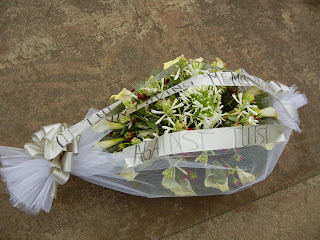Yesterday, July 4th, was a holiday in Rwanda: Liberation Day. It celebrates the defeat of the previous regime (Interhamwe or Hutu Power) by the RPF army, subsequently ending the 1994 Rwandan genocide. One hundred days before Liberation day, Rwandans begin their time of remembrance, when posters similar to the one below are put up all over the city to commemorate the time of reflection of the horrid past events and death of loved ones. It also serves as a way of helping to prevent was is termed "genocide ideology" or the growth of hatred based on ethnicity or specific affiliations. This year was the 22nd that has passed since the end of the Rwandan genocide.
Here is an article that describes the celebration that took place 2 years ago, for the 20th anniversary of Liberation Day in Rwanda.
In honor of both the American 4th of July and Rwandan Liberation day, Lizzy baked banana pancakes and I ate them:





